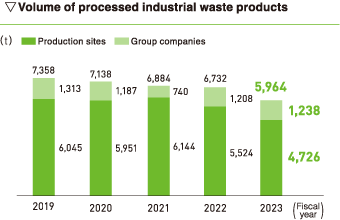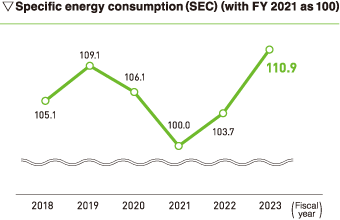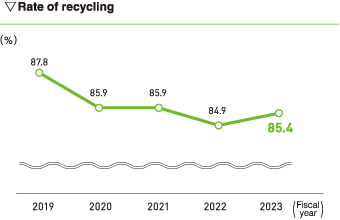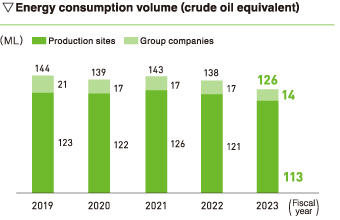Unitika’s Environmental Preservation Activity History
The Unitika Group has been continuing with and evolving our environmental preservation activities for over 50 years. We will continue with our environmental management into the future.
Pollution problem became a major issue in Japan in 1973. That year, Unitika enacted the Environmental Preservation Regulations, making a clear distinction between environmental measures and outward-directed production activities, to enable compliance with regulatory and standards values. In 1991, we created a companywide organization called the Environmental Preservation Committee. In 1993, we enacted the Unitika Global Environment Charter, and the following year in 1994, we began yearly environmental auditing, establishing the basic direction for our environmentally-aware management style that has continued to this day.
Since FY 1997, Unitika has been promoting environmental preservation activities based on the Medium-Term Environmental Plan.
| September 1973 | Created and implemented Environmental Preservation Regulations. |
|---|---|
| October 1991 | Revised Environmental Preservation Regulations, established Environmental Preservation Committee. |
| April 1993 | Created and implemented Global Environmental Charter. |
| May 1993 | Revised Environmental Preservation Regulations, enacted and enforced as Environmental Regulations, and set up and held annually the Environment Committee. |
| May 1994 | Started environmental audits (once per year). (Voluntary audits by each production site, and internal audits by headquarters staff.) |
| July 1996 | Created targets for first Medium-Term Environmental Plan (FY 1997 to 1999). |
| September 1996 | Started publishing Kankyo, our in-house newsletter on environmental issues. |
| October 1997 | Started activities aimed at becoming ISO 14001-certified at our major production sites. |
| January 1998 | Created and implemented Unitika Charter of Corporate Behavior. |
|---|---|
| January 1999 | Unitika Chemical was awarded ISO 14001 certification (first in Group). |
| October 2000 | Created targets for second Medium-Term Environmental Plan (FY 2000 to 2002). |
| April 2001 | Created Unitika Action Standards. |
| October 2002 | Published Unitika Environmental Report. |
| October 2002 to March 2023 |
Implemented the Medium-Term Environmental Plan (third to ninth). |
| April 2023 | The Tenth Medium-term Environmental Plan (FY 2023 to FY 2025 ) currently underway Medium-Term Environmental Plan (FY 2023 to 2025). |
Basic Environmental Policy
The Unitika Group named 1993 as an Environmental First Year, when we enacted the Unitika Global Environment Charter compiled from our pledge, basic philosophy, and action guidelines. Since then, we have complied with this Charter to ensure that our corporate management methods are environmentally aware, working on a range of environmental activities.
Unitika Global Environment Charter
Pledge
The growth and development of mankind is rapidly altering our planet’s air, water and soil, threatening both the global biosphere and our own future, since both must depend on a finite ecosystem. As a corporation with more than a century of business activities contributing to the public good, we are highly aware of the demanding conditions now facing the global environment. The Charter is the declaration of our intention to focus more attention on protecting and helping the environment, making appropriate environmental action the core of our business activities.
Basic Philosophy
We conduct corporate activities contributing to coexistence between people and nature by connecting people’s lives and technology.
Action Guidelines
1. Considering the Global Environment Always
The Unitika Group always considers the effects of our corporate activities on the global environment, following a rigorous set of management procedures during product manufacture to prevent harm to it.
2. Contributing through Technology Development
We aggressively research and develop technologies to protect and help the global environment.
3. Using Resources and Energy Efficiently
We promote efficient use of resources and energy, and recycle limited resources.
4. Carrying out PR and Educational Activities
We organize a large number of PR activities that provide information on protecting and helping the global environment, and promote and implement a wide range of educational events.
5. Drawing on the Complete Range of Unitika Group Competencies
Following the mandates of the Charter, we draw on our complete range of competencies to protect and help the global environment.
Management System
The Unitika Group’s Environment Committee manages the environment-related initiatives of the Group, and also coordinates specific energy-saving activities.
The Environmental Committee consists of 14 members, chaired by the senior executive officer who is the general manager of the Technology Management Division, and including three directors, four executive officers, the general manager of the Global Business Promotion Division, the general manager of the ACF Division, the general manager of the Nonwoven Fabrics Division, and the general managers of the Uji, Okazaki, and Tarui Plants. The committee verifies the basic plans for environmentally friendly management and its progress, reports on the results of environmental audits conducted by the committee secretariat at each business location and Group company, and deliberates on other important environmental matters.
Every year, the production sites and related companies carrying out production activities share the energy-saving themes they have compiled at the Environment Committee, and the Committee checks on the progress of these energy-saving activities. The Committee also checks the specific energy consumption (SEC), energy consumption amount, and CO2 emissions, and promotes energy-saving activities with a target of a 1% yearly improvement of the specific energy consumption (SEC).
Since FY 2022, Unitika’s production sites and affiliated companies have been setting up a system to implement energy-saving activities, with the aim of actively promoting efforts to conserve energy and reduce CO2 emissions.
ISO14001 Certification
The Unitika Group have become certified under ISO 14001, which is the international standard for environmentally-aware corporate activities, for three production sites (Uji, Okazaki and Tarui) and major Group companies. We have also started activities to help our affiliates obtain ISO 14001, while also conducting environmental audits of each company.
ISO 14001-Certified Unitika Plants
【Unitika Ltd.】
Uji Plant; Okazaki Plant; Tarui Plant
【Group companies】
Ad’All Co., Ltd.
Unitika Textiles Co., Ltd., Tokiwa Mill
Nippon Ester Co., Ltd., Okazaki Plant
Unitika Glass Fiber Co., Ltd., Kyoto Plant
Unitika Glass Fiber Co., Ltd., Tarui Plant
Terabo Co., Ltd.
Medium-Term Environmental Plan
The Tenth Medium-Term Environmental Plan (FY 2023 to FY 2025)
In FY 2023, the first fiscal year of the Tenth Medium-Term Environmental Plan, the energy consumption and CO2 emissions were reduced due to reduced production activities within the Group. The reduction in the amount of off-site disposal of industrial waste also progressed due to the impact of the decline in production amounts and the promotion of converting waste to valuable resources. On the other hand, the targets for improvement of specific energy consumption and in-process recycling rate were not achieved due to the decrease in production amounts. As a result, we achieved three of our five environmental targets.




(Note) The base year has been changed to FY 2021 because the Mid-term Environmental Plan has moved to the 10th period.




| Issues | Reference FY | Baseline Values | Target Values | Improvement Targets for Each Reference FY | FY 2023 Actual Results | Evaluation Results |
|---|---|---|---|---|---|---|
| Reduction of the Amount of Industrial Waste Disposed of Outside the Plants | FY 2019 | 7,357 t | 6,773 t | Reduced by 8% | 5,964 t | Achieved |
| Improvement of Recycling Rate | FY 2021 | 85.9% | 87.0% | Improved by 1.1points | 85.4% | Not Achieved |
| Reduction of Energy Consumption Volume | FY 2021 | 143 ML | 137 ML | Reduced by 4% | 126 ML | Achieved |
| Improvement of Specific Energy Consumption (SEC) | FY 2021 | 0.722 L/kg | 0.683 L/kg | Improved by 5% | 0.801 L/kg | Not Achieved |
| CO2 Emissions Reductions* | FY 2013 | 357 kt/year | 271 kt/year | Reduced by 24% | 231 kt/year | Achieved |
*CO2 emissions are different from the figures reported in the Annual Securities Report due to a change in the calculation standard from FY 2023.
